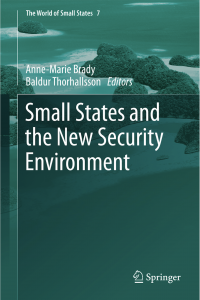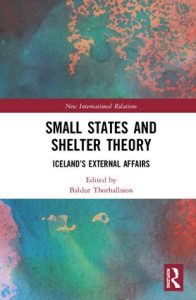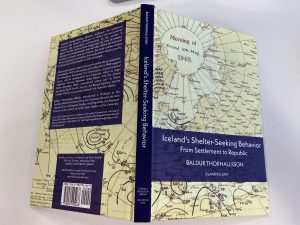 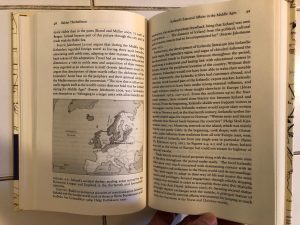 Iceland's Shelter-Seeking Behavior: From Settlement to Republic, Thorhallsson, Baldur (editor). ISLANDICA LXIII, Cornell University Library, Cornell University Press), 2021. Iceland's Shelter-Seeking Behavior: From Settlement to Republic, Thorhallsson, Baldur (editor). ISLANDICA LXIII, Cornell University Library, Cornell University Press), 2021.
Iceland's Shelter-Seeking Behaviour challenges the traditional narrative that Iceland's submission to foreign rule and external relations had catastrophic consequences for the country. It agrees that this narrative both exaggerates the cost of external relations and underestimates their benefits. Within the historical context of Iceland's external relations, the book outlines shelter theory, applying its assumption that small polities need economic, political, and societal shelter in order to prosper. - Analysis of Iceland's external relations from the Norse settlement, a little before 900, to the creation of the Republic in 1944 suggests that throughout the period, this islands nation enjoyed essential shelter, vital for development and prosperity, which its larger neighbours - Norway, Denmark, Great Britain and the United States - provided. Other international actors, such as Hansa merchants; Dutch, French, Spanish, and Basque mariners; and the Catholic Church, also provided Iceland with important shelter. Small States and the New Security Environment, with AM. Brady (eds.). (Springer), 2021.
The book presents the theory of shelter (which is derived from the diverse and extensive literature on small states) and uses it to examine how small states respond to new and old security threats. Shelter theory addresses three interrelated issues of common concerns to small states: the reduction of risk before a possible crisis event, assistance in absorbing shocks in times of crises, and help in recovering after such an event. In short, shelter theory claims that small states need external shelter in order to survive and prosper. They are dependent on the economic, political, and societal shelter provided by larger states, as well as regional and international organizations. Small States and Shelter Theory: Iceland’s External Affairs Small states are dependent on the economic, political, and societal shelter provided by larger states and international organizations to survive and prosper. Iceland provides an ideal case study for shelter theory, due both to its smallness as compared with its larger neighbouring states, as well as its status as both an entity and then as a state. That Iceland has historically been so isolated, relative to other small European states, also makes it easier to trace the country’s interactions with other actors, since the impact of each interaction can be measured more definitively thus broadening the theory’s validity and offering new insights into its operations. By unpacking the structure of Iceland’s external relations, this book demonstrates both the size-related disadvantages and the unique needs of small states to evaluate, explain, and predict small state behaviour. |
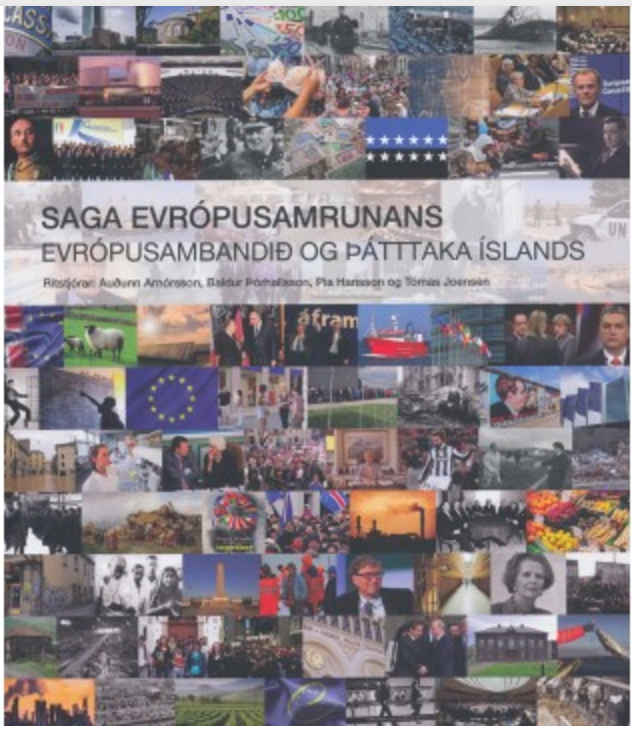 Saga Evrópusamrunans: Evrópusambandið og þátttaka Íslands, (ed.) (Reykjavík: Háskólaútgáfan), 2015. Saga Evrópusamrunans: Evrópusambandið og þátttaka Íslands, (ed.) (Reykjavík: Háskólaútgáfan), 2015.
The first Icelandic textbook on European integration. The contributors explain European decision-making and cover different EU policy areas. Iceland participation in the European project through EFTA, EEA and Schengen is examined. The challenges and opportunities for small European states is covered. |
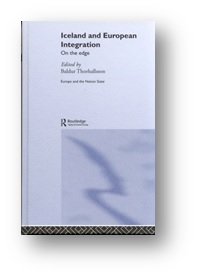 Iceland and European integration: On the Edge, (ed.) (England: Routledge), 2004. Iceland and European integration: On the Edge, (ed.) (England: Routledge), 2004.
The contributors explain why the Icelandic political elite has been reluctant to participate in European integration. In this context, they analyse the influence that Iceland's special relationship with the US and the fisheries sector have had on their dealings with the EU. Also considered are 'new' variables, such as national administrative characteristics and particular features of the domestic arena of the political elite, as well as the elite's perception of international relations and its political discourse concerning independence and sovereignty (Amazon.co.uk). |
|
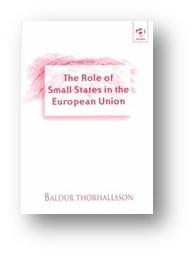 The Role of Small States in the European Union, (England: Ashgate), 2000.An examination of small states in the European Union. The book argues that size is a significant variable in explaining the behavior of smaller states in the decision-making process of the European Union in the areas of the Common Agricultural Policy (CAP) and the Regional Policy. Each state has, of course, its own characteristics - historical, geographic, cultural and institutional - but some small states have some common problems. If these characteristics of the smaller states can be differentiated from the characteristics of the larger states, it can be expected that these characteristics will influence the behavior of smaller states in the decision-making process of the EU (Amazon.co.uk). The Role of Small States in the European Union, (England: Ashgate), 2000.An examination of small states in the European Union. The book argues that size is a significant variable in explaining the behavior of smaller states in the decision-making process of the European Union in the areas of the Common Agricultural Policy (CAP) and the Regional Policy. Each state has, of course, its own characteristics - historical, geographic, cultural and institutional - but some small states have some common problems. If these characteristics of the smaller states can be differentiated from the characteristics of the larger states, it can be expected that these characteristics will influence the behavior of smaller states in the decision-making process of the EU (Amazon.co.uk). |

